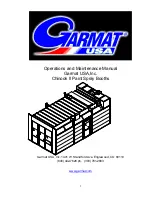
Milan / Paylink System Manual
Issue 1.5 29 January 2020
CONFIDENTIAL
Not to be disclosed without prior written permission from Aardvark Embedded Solutions Ltd
Page 69 of 71
F56 Protocol
[SPECIAL BILLS] [UK NOTES] DELIVERY [AT] NONE | FRONT | REAR [HOLD ON PROBLEM]
[POOL <Count>]
An F56 communications line can connect to one singe Fujitsu F56 family bill / note dispenser.
The
SPECIAL BILLS
keywords set the polymer note configuration flag.
The
UK NOTES
keywords set the configuration flag for the new UK £5.
Paylink
requires
the specification of the note delivery system, so as to know whether to issue
a delivery command, and which one.
On an F56, the
HOLD ON PROBLEM
option sets a processing flag so that Paylink will only
deliver bills when there has been no problem in the payout.
On an F56, the
POOL
option sets the number bills that are collected at the pool stage before
being delivered by Paylink. The default if this is not specified is 50 bills.
MFS Protocol
An MFS communications line can connect to one singe MFS bill / note dispenser.
Cassettes
The cassettes for bill Dispensers can optionally be configured.
F53 / F56 / F400 cassettes are identified, usually by one or two magnets fitted into the case
that identify the bills / notes that are loaded into the
cassette
(
not
the position in the
machine). This section maps these identities onto specific notes.
CASSETTE [WITH] <Identity> VALUE <Value> [MAX <Max>] [MIN <Min>]
[THICKNESS] <thickness>]
This specifies that the cassette with the given magnet <Identity> contains bills / notes with
the given value (in cents / pence).
Paylink will default to allowing any size note to be accepted, but for added security correctly
encoded length and thickness bytes
<Max>
,
<Min>
and <
thickness
>
can
optionally be
specified and will be sent to the F53/F56 during cassette initialisation.
Examples
F56 cassettes typically contain two magnets, and so a common standard configuration uses
the six two bit numbers:
Cassette 3 Value 10000
Cassette 5 Value 5000
Cassette 6 Value 2000
Cassette 9 Value 1000
Cassette 10 Value 500
Cassette 12 Value 100
Less common is one magnet, but an alternative set uses the four one bit numbers:
Cassette 1 Value 10000
Cassette 2 Value 1000
Cassette 4 Value 500
Cassette 8 Value 100



































